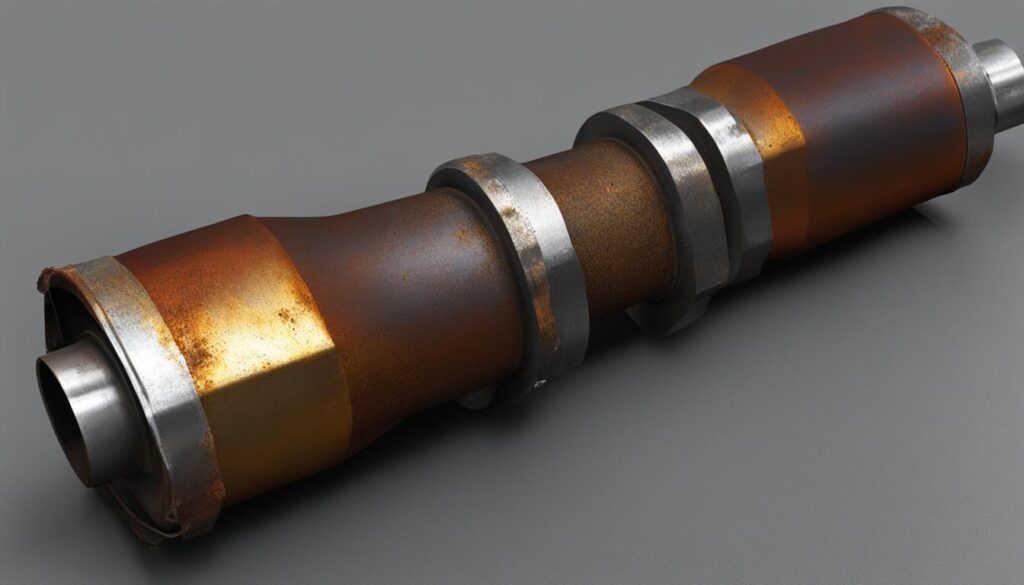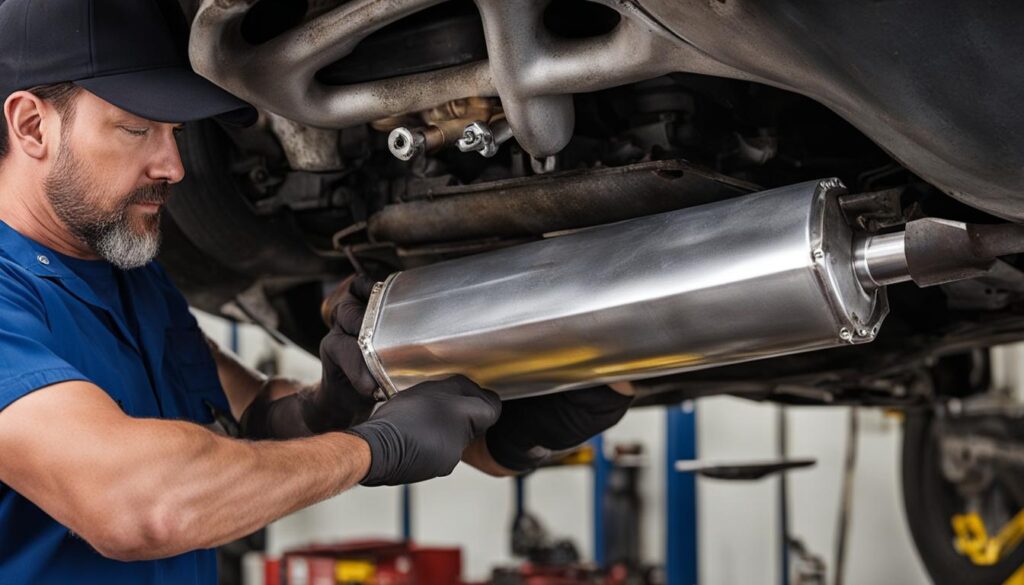A catalytic converter is an essential component of a vehicle’s exhaust system, responsible for reducing harmful emissions. As a car owner, you may wonder about the lifespan and durability of this critical part. Understanding how long a catalytic converter lasts can help you plan for maintenance and potential replacements.
Key Takeaways:
- The average lifespan of a catalytic converter is designed to last the life of the vehicle, but various factors can lead to premature failure.
- Signs of a failing catalytic converter include an illuminated check engine light, engine performance issues, a no start condition, and a failed emissions test.
- Catalytic converters can fail due to a faulty air-fuel mixture, contamination from fluids, engine misfires, skipping routine service, or excessive idle time.
- Proper maintenance and keeping the car running optimally can help extend the life of the catalytic converter.
- If symptoms of a bad catalytic converter arise, it’s recommended to have it diagnosed by an expert mechanic before considering a replacement.
What is the Lifespan of a Catalytic Converter?
A catalytic converter is a crucial component of a vehicle’s exhaust system, responsible for reducing harmful emissions and ensuring compliance with environmental regulations. It is designed to last up to 10 years or more, with the intention of lasting the entire lifespan of the vehicle. However, various factors can contribute to its degradation and premature failure.
Over time, a catalytic converter can deteriorate due to the high temperatures it operates in and the constant exposure to exhaust gases. Engine performance problems, such as misfires and faulty air-fuel mixtures, can increase the stress on the catalytic converter and lead to its early failure. Additionally, external factors like impact damage from road debris can cause physical damage and render the converter ineffective.
To maximize the lifespan of your catalytic converter, it is essential to maintain your vehicle properly. Regularly servicing your engine, addressing any performance issues promptly, and avoiding excessive idle time can help extend its longevity. By taking proactive measures, you can protect your catalytic converter and ensure optimal vehicle performance while reducing emissions.
Table: Factors Affecting the Lifespan of a Catalytic Converter
| Factors | Impact on Lifespan |
|---|---|
| Engine Misfires | Increases stress, leading to premature failure |
| Faulty Air-Fuel Mixture | Causes increased strain, reducing the converter’s lifespan |
| Impact Damage from Road Debris | Physical damage can render the converter ineffective |
| Poor Vehicle Maintenance | Lack of regular servicing can contribute to degradation |

Summary:
A typical catalytic converter is designed to last up to 10 years or more, aiming to match the lifespan of the vehicle. However, various factors such as engine misfires, faulty air-fuel mixtures, impact damage from road debris, and poor vehicle maintenance can contribute to premature failure. To maximize the lifespan of your catalytic converter, ensure proper engine performance, address issues promptly, and practice regular vehicle maintenance.
What Causes a Catalytic Converter to Fail?
A catalytic converter is a crucial component of a vehicle’s exhaust system, responsible for reducing harmful emissions. Over time, however, various factors can lead to the failure of this essential part. Understanding the causes of catalytic converter failure can help car owners take preventive measures and ensure optimal performance. Here are some common reasons for catalytic converter failure:
- Incorrect air/fuel mixture: A catalytic converter relies on a specific air/fuel ratio to function effectively. If the engine is running too rich (excess fuel) or too lean (insufficient fuel), it can result in excessive heat generation within the converter, leading to its failure.
- Contamination from fluids: Fluids such as engine oil or coolant can find their way into the exhaust system and contaminate the catalytic converter. This contamination can impair the converter’s ability to perform its function and ultimately cause it to fail.
- Engine misfire: An engine misfire occurs when one or more cylinders fail to ignite properly. This can result in unburned fuel entering the exhaust system, causing the converter to overheat and deteriorate over time.
- Engine overdue for service: Neglecting routine maintenance, such as replacing spark plugs or oxygen sensors, can lead to engine problems that put excessive strain on the catalytic converter. Regular servicing is essential to prevent converter failure.
- Impact damage from road debris or rust and corrosion: The catalytic converter is located underneath the vehicle, making it susceptible to damage from road debris or corrosion caused by exposure to moisture and salt. Physical damage can obstruct the flow of exhaust gases and impair the converter’s performance.
- Excessive idle time: Extended periods of idling can lead to an inefficient air/fuel mixture, causing the catalytic converter to become clogged or overheated. Reducing idle time can help prevent converter failure.
By understanding the causes of catalytic converter failure, car owners can take proactive steps to maintain and prolong the lifespan of this vital component. Regular maintenance, prompt repairs of engine issues, and avoiding conditions that can potentially damage the converter are key to ensuring its longevity.

Table: Common Causes of Catalytic Converter Failure
| Cause | Description |
|---|---|
| Incorrect air/fuel mixture | An imbalanced ratio of air to fuel can lead to excessive heat and eventual failure of the catalytic converter. |
| Contamination from fluids | Fluids like engine oil or coolant can contaminate the converter, impairing its performance and causing failure. |
| Engine misfire | When the engine fails to ignite properly, unburned fuel can enter the converter, leading to overheating and deterioration. |
| Engine overdue for service | Neglecting routine maintenance can result in engine problems that strain the converter and contribute to its failure. |
| Impact damage from road debris or rust and corrosion | Physical damage from road debris or rust can obstruct exhaust flow and impede the converter’s function. |
| Excessive idle time | Prolonged idling can cause clogging or overheating of the catalytic converter, leading to failure. |
When Should You Replace a Catalytic Converter?
If you notice any signs of a failing catalytic converter, it is important to address the issue promptly to avoid further damage to your vehicle and potential environmental pollution. The following are some indicators that it may be time to replace your catalytic converter:
- Check Engine Light: If the check engine light is illuminated on your dashboard, it could be a sign that your catalytic converter is not functioning properly. It is recommended to have the issue diagnosed by a certified mechanic to determine if replacement is necessary.
- Poor Odor: A strong, unpleasant odor coming from the exhaust can indicate a malfunctioning catalytic converter. This could be caused by a build-up of pollutants or a failure of the converter to properly convert harmful gases into less harmful substances.
- Starting Issues: Difficulty starting your vehicle or a no-start condition could be a result of a clogged or damaged catalytic converter. This can happen when the converter becomes excessively clogged with debris or when the internal components fail.
- Reduced Fuel Efficiency: If you notice a significant decrease in fuel efficiency, it could be a sign that your catalytic converter is not functioning optimally. A failing converter can lead to incomplete combustion, resulting in wasted fuel and reduced mileage.
It is important to note that these signs can also be indicative of other issues with your vehicle, so it is recommended to consult with a professional mechanic for an accurate diagnosis. They will be able to determine if the catalytic converter needs to be replaced or if there are other underlying issues that need to be addressed.
Additionally, if your catalytic converter gets stolen, it should be replaced as soon as possible. A missing converter can lead to increased emissions and harm the environment. It is also illegal to drive a vehicle without a functioning catalytic converter in many jurisdictions.
In summary, if you experience any of the signs mentioned above, it is advisable to have your catalytic converter inspected and replaced if necessary. A properly functioning catalytic converter is crucial for reducing emissions and ensuring the efficient operation of your vehicle.

Table: Signs of a Failing Catalytic Converter
| Signs | Description |
|---|---|
| Check Engine Light | Illuminated check engine light on the dashboard |
| Poor Odor | Strong, unpleasant odor from the exhaust |
| Starting Issues | Difficulty starting the vehicle or a no-start condition |
| Reduced Fuel Efficiency | Significant decrease in fuel efficiency |
Conclusion
A catalytic converter plays a vital role in your vehicle’s exhaust system, helping to reduce harmful emissions and ensure optimal performance. To maximize the lifespan of your catalytic converter, it’s important to take proper care of it.
Regular maintenance is key to extending the life of your catalytic converter. This includes following your vehicle’s recommended service schedule, addressing any engine performance issues promptly, and checking for fluid leaks that could contaminate the converter.
Additionally, avoiding excessive idle time can help prevent unnecessary wear and tear on your catalytic converter. If you often find yourself idling for long periods, consider turning off the engine when parked or in traffic to reduce the strain on the converter.
By following these tips and taking proactive measures to care for your catalytic converter, you can not only extend its lifespan but also contribute to reducing emissions and ensuring the proper functioning of your vehicle. Remember, when signs of failure appear or if your catalytic converter is stolen, prompt replacement is crucial to maintain your vehicle’s performance and environmental compliance.
FAQ
How long does a catalytic converter typically last?
A typical catalytic converter is designed to last the life of the vehicle, but this doesn’t always happen. It is supposed to last up to 10 years or more.
What causes a catalytic converter to fail?
Several factors can lead to catalytic converter failure, including a faulty air-fuel mixture, contamination from fluids like engine oil or coolant, engine misfires, skipping routine service, and excessive idle time. External impact from road debris can also damage a catalytic converter.
When should you replace a catalytic converter?
If your car shows signs of a bad catalytic converter, such as engine misfire, poor odor from the exhaust, check engine light on, trouble starting the vehicle, or reduced fuel efficiency, it’s recommended to have it diagnosed by an expert mechanic. They can determine if the catalytic converter needs replacement or if the symptoms are caused by other issues. Additionally, if a catalytic converter gets stolen, it should be replaced as soon as possible.
